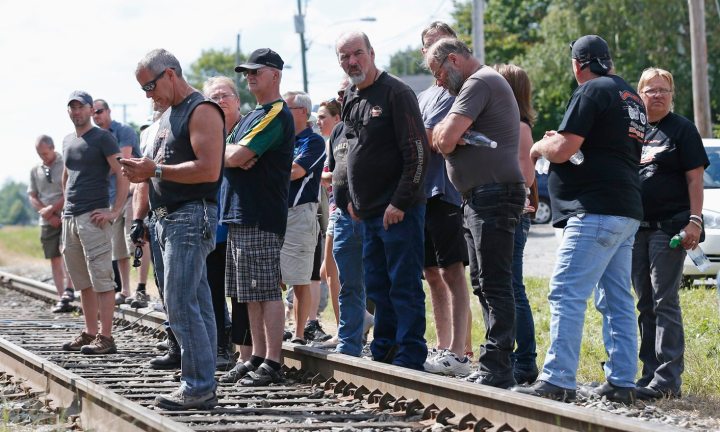Newsdeck
Rail at center of Quebec town tragedy and heart of its recovery

It was a runaway train that caused this month's deadly inferno in Lac-Megantic, but the Canadian town's leaders, business owners and many of its residents see the railway as crucial to their survival and want it operating again as soon as possible. By Phil Wahba and Julie Gordon.
Fifty people, including 17 still missing, are believed to have been killed on July 6 when a driverless train with 72 oil tanker cars crashed and exploded in the center of the picturesque, lakeside town in rural Quebec. The fire burned for hours and dozens of buildings were leveled.
The derailment was the worst railway disaster in North America in 24 years, and cut off Lac-Megantic’s companies from the railroad that ships their products to customers, including exports to Maine, just 18 miles (29 km) away.
While many of the town’s 6,000 residents are incensed that trains carrying such flammable cargo can pass through an area with bars, restaurants and other local businesses, they also say the rail is their economic lifeline.
“We don’t want to lose the train. We want our economy to function,” said Raymond Lafontaine, the owner of an excavation and pavement company that has 175 workers, making it one of the town’s largest employers.
Lafontaine lost a son, two daughters-in-law and an employee in the disaster. He said no money is coming in and he is worried about how long he can hang on without the ability to pay his employees. His 46-year-old company, which makes most of its revenue in Lac-Megantic, had just begun work on a major repavement project downtown.
The derailment is widely expected to spur changes in Canadian railway regulations, and has fueled the debate about the safety of using railroads to transport oil.
Lac-Megantic Mayor Colette Roy-Laroche said she will ask the federal government to draw up a new route that skirts the town center when the rail line is rebuilt.
Lac-Megantic is located in the less prosperous part of Quebec’s Eastern Townships, a region with a 6.4 percent unemployment rate, lower than the provincial average.
The town’s namesake lake, a deep blue expanse of water that is close to two provincial parks, and nearby mountains covered with dark pine and birch trees, attract hundreds of thousands of visitors a year. Very little oil from the wrecked tanker cars made it into the lake.
Still, Lac-Megantic is primarily an industrial town, with an industrial park east of its downtown. Even before the crash, many houses and businesses had been put up for sale or for rent on Rue Laval, the town’s main artery. Locals said jobs can be hard to find.
RAIL SPUR
As the disaster site is still an active crime scene investigation that is likely to be closed for weeks, Lac-Megantic’s mayor and business leaders said they want to build a temporary track that would connect to parts of the railway outside the restricted red zone. The timing is uncertain.
“We have no sense whatsoever of when we’ll be able to examine any possible solution,” Roy-Laroche told Reuters. “The rail is essential to our industries.”
The railway also is key for Tafisa’s particle board manufacturing plant in Lac-Megantic’s industrial park, which makes cabinetry products from wood fiber that would otherwise be discarded as waste and is North America’s largest such facility.
Prior to the derailment, Tafisa used a rail connection to the main line to transport its products. After sitting idle for five days the plant resumed operations on Thursday, using trucks instead of the railway.
But shipping by truck is much more expensive than by rail and untenable over the long term, Lac-Megantic’s mayor said.
The Quebec government plans this week to unveil an emergency aid plan for the town’s businesses, in addition to the C$10 million ($9.6 million) that were part of a C$60 million emergency fund set aside for companies.
Despite deep anger at the management of the railway operator – Montreal, Maine and Atlantic Railway – over the accident, the town’s residents say they want the railroad to remain but with better regulation and a ban on transporting oil and gas through the center of their own town.
“For industry yes, but for the oil and gas transport, I don’t think so,” Rejean Champagne, a resident of a condo in Lac-Megantic’s evacuation zone, said when asked if the railway should reopen.
Ghislain Bolduc, who represents Lac-Megantic in predominantly French-speaking Quebec’s provincial assembly, said the town’s economy was inextricably tied to the railway.
“It has been the economic engine of this town for 145 years and it is still the economic engine. So do you want it to disappear? Or you want it to be there, but in a proper way?”
Rebuilding the economy will take years and many residents, like Lafontaine, are too busy grieving for lost ones to think far out.
“Everyone is in mourning, everyone is crying,” he said of his employees. DM
Photo: People on the railway close to the train wreck look on while the Mayor Colette Roy-Laroche (unseen) speaks during a news conference in Lac-Megantic, July 13, 2013. The crude oil freight train that derailed and blew up in the small town of Lac-Megantic early on Saturday morning was traveling far too fast when it went off the rails, investigators told reporters on Tuesday. REUTERS/Mathieu Belanger



















 Become an Insider
Become an Insider